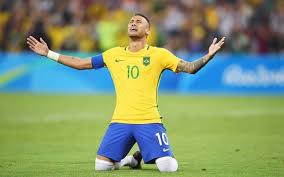By Samindra Kunti in Rio de Janeiro
August 22 – Brazil won their desperately desired gold medal at the Rio 2016 Olympic Games after a combustive and compelling 120 minutes of box-to-box football in the final at the Maracana against Germany. In a storyline that not even the most clichéd of writers would have dared to write, it was Neymar who delivered salvation from the penalty spot with the fifth and final kick of the shoot out.
“Winning the gold medal is almost an obligation because of the weakness of the opposition,” wrote Brazilian 1970 player and Brazil’s leading football columnist Tostao in the run-up to the final. “Will victory be the start of a recuperation, or will it be an illusion, postponing the search for a better way forward?”
That was the defining question around football’s gold medal match, an encounter between iconic teams, different schools of football who have made the pass a central motor of their game but with a different finality – for Brazil, the pass serves individuality, skills and dribbles – supposedly the essence of Brazilian football – and for Germany, it’s the prelude to realistic attacking.
The final itself was not a pent-up grudge match for that unforgiving afternoon in Belo Horizonte, when the Germans showcased the best of modern football: plenty of ball possession, swift transitions, quick-fire passing, superb movement and lethal counterattacking. Die Nationalmannschaft had revealed its own superb version of the game. In the space of 90 minutes, Brazilian football had become outdated, outmoded and irrelevant.
The Olympic final had a different nature – it was the culmination of a glorified U23 competition that had generally been of a poor standard, and with little global impact, perhaps even a nuisance in the Olympic cosmos. A mixed bag of participants, including Fiji and Iraq, competed to the backdrop of a suffocating 16-day obsession with shooting, archery, wrestling and a swathe of other less high profile sports.
Brazil were utterly amorphous in their opening group games against South Africa and Iraq respectively. Rogerio Micale’s 4-3-3 system was dysfunctional, with a giant no-man’s-land between the midfield and the attack. As a consequence, fluency and constructive passing were missing from the Brazilian game. They heavily relied on individual flashes from Neymar or Gabriel Barbosa and Jesus, both emerging talents.
In the crunch pool game against Denmark, Micale tweaked his tactics, with a bold 4-2-4. Luan from Brazilian club Gremio came into the attack, next to Neymar, with Brazil’s two Gabriels often drifting inside. Wallace played as the lone specialist defensive midfielder. Brazil brushed the Scandinavians aside, 4-0.
Under Micale, Brazil progressed taking the sting out of tricky knockout games against Colombia and Honduras with early goals, winning 2-0 and 5-0 respectively, inching ever closely to a fetishized gold medal. That was progress, in the Ordem & Progresso sense – not just the results, but the manner, a daring expression of Brazilian-ness, rekindling the game of old.
On Saturday afternoon, at the Maracana, the cathedral of Brazilian football, Brazil’s Olympic dreams finally materialised, but at times, the spectres of the Maracanazo, Brazil’s infamous 1950 World Cup defeat, and the Mineirazo, surfaced.
Germany dominated the opening phase of the game, but it was Neymar who opened the scoring, with a delightful weighted free-kick. A yellow and jingoistic sea erupted in the stands, an apocalyptic bedlam.
Unfazed, Germany hit the woodwork three times before Max Meyer deservedly equalized. Toljan ran down the right and the German captain clipped the ball into the corner, an indictment of Brazil’s defensive laxness and a strike of rippling severity. Meyer kissed his shirt with the number seven. Angst and frisson were now palpable. Brazil fought on, even pressed in the dying seconds of extra-time, but the inevitable arrived duly, a penalty shout-out.
Neymar converted the fifth and decisive penalty. Cue pandemonium and delirium. Neymar and Micale sobbed in each other arms. Gold, sweat and tears for Brazil – and a minimum measure of redemption.
“It is a conquest that we have wanted for a long time,” said coach Micale. “I believe it is phase that passes and that for the future we will have more security going. Our football is not dead.”
For Brazil it was as if they had won the whole Olympics, not just the men’s football tournament.
The Bronze medal was taken by Nigeria who had been the beaten finalists in Beijing in 2008. Nigeria defeated Honduras 3-2 and also won a cheque for $390,000 from Japanese plastic surgeon Katsuya Takasu had been so impressed with their fighting spirit he had promised to reward them if they won a medal after hearing about their financial difficulties before and during the tournament.
Contact the writer of this story at moc.l1714053493labto1714053493ofdlr1714053493owedi1714053493sni@i1714053493tnuk.1714053493ardni1714053493mas1714053493

